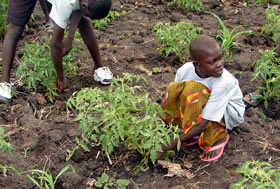FAO: Good Practice Example 2
Junior Farmer Field and Life School Programme

The Junior Farmer Field and Life School (JFFLS) programme is designed to enable young women and men, boys and girls to enhance their agricultural and entrepreneurship skills; thus contributing to enhanced livelihoods, improved income, employment opportunities and better access to markets. It is also designed to strengthen the capacities of local women and young farmers' associations and organizations. The JFFLS approach has been adapted progressively to the specific contexts of Mozambique, Kenya, Rwanda, Burundi, DRC and 13 other countries in Africa, Asia and the Middle East. It provides a platform for integrating multiple interventions and bridging activities, such as agricultural and life skills development, legal empowerment, vocational educational training opportunities and employment promotion. The JFFLS approach includes an employment-oriented component which encourages and supports young women and men to participate in existing young farmers' or women's cooperatives through which they can access resources and market their produce more easily.
JFFLS has been introduced in vulnerable communities when the transmission of traditional knowledge from generation to generation has been severely disrupted by high HIV rates, war, displacement and death, and where the associated erosion and fragmentation of social capital has led to diminished coping strategies, increased gender disparities, limited skills and low self-esteem. This approach has been successful in regions of chronic emergencies (due to conflicts or natural disasters such as drought) where affected communities are highly dependent on farming for food and income security.
Evidence of Positive Change in Rural Women's Lives
The innovative method of combining agricultural knowledge acquisition with life skills and awareness of socio-economic issues has contributed to empowering young women and girls, enhancing their self-esteem, creating productive livelihood opportunities, and enabling them to exercise greater control over decisions and processes that affect their lives and livelihoods. Within this one-year learning cycle, legal empowerment (such as training sessions on property rights, prevention of child labour and gender-based violence) is combined with legal awareness and capacity building to enable rural women and girls to access and use existing legal services and mechanisms to protect their lives and livelihood assets. For instance, girls and boys who had the opportunity to discuss and interact among themselves during the JFFLS sessions demonstrated dramatic changes in their gender relations within their households and communities.
While learning about agricultural skills, young girls and women have initiated good agricultural practices within their households, where increased food availability (through production) and food access (through income generation and increased purchasing power) is helping to ensure stability over time. In countries where entrepreneurship skills development have been introduced, greater opportunities for employment and self employment were recorded (Burundi, Central African Republic (CAR), Democratic Republic of the Congo (DRC), Kenya, Malawi, Mozambique, Nepal, Rwanda, Sudan, Tanzania, Tunisia, Uganda, West Bank and Gaza Strip).
Programme Origins and Results
As a response to the AIDS epidemic and the large numbers of orphans and vulnerable children, in January 2004, FAO introduced the Junior Farmer Field and Life Schools (JFFLS) project in Mozambique. The project was introduced as a pilot exercise in one urban and three rural faith-based organizations' (FBO) near Chimoio, the provincial capital of Manica as a partnership among FAO, WFP (with a school feeding programme) and the provincial directorates of the Ministry of Agriculture, the Ministry of Education and the Ministry of Women and Coordination of Social Action. The direct beneficiaries were around 100 children. In 2004, the pilot exercise was expanded to 24 more schools, linked to the formal education system, thus covering nine districts in Manica Province as well as four districts in the neighboring province of Sofala. To date there are 58 JFFLS linked with formal schools in Mozambique alone and more than 10,000 girls and boys have been trained.
After Mozambique, 18 countries introduced the JFFLS approach with significant creative adaptations and innovations from the original project design, in keeping with different local contexts. The JFFLS approach has been adapted to address the orphan crisis associated with the HIV epidemic, emergency situations, rural youth employment and child labour prevention.
As a result of the Government commitment in Mozambique, Rwanda, Burundi, Kenya and Malawi the Ministry of Agriculture and Education are providing extension staff and teachers as master trainers to train rural facilitators of the field schools. After the successful implementation phase in Manica and Sofala provinces, the JFFLS approach will be adopted by the Mozambique Ministry of Education, so that agricultural, life and entrepreneurship skills can be incorporated into the formal school curriculum.
By involving local NGOs and associations: In Kenya, Rwanda, Burundi, Central African Republic and Uganda, local (trained) partners are now including JFFLS in their own contexts and project proposals at local level, thus contributing to the up-scaling of the approach.
Keys to the Success of the Project
The strengths of the JFFLS programme include its:
- Unique learning methodology and curriculum, which combines agricultural, life and entrepreneurship skills in an experiential and participatory learning approach uniquely suited to rural communities and low literacy levels. The JFFLS learning agricultural cycle promotes the creation of gender-equal attitudes, by enabling youth to exercise the same roles and responsibilities and developing their capacities to critically assess relationships and understand the risks and resources present within their communities.
- Modality of intervention: The implementation of the JFFLS programme is preceded by season long training of master trainers who will later train the facilitators. This has shown to be crucial for strengthening facilitators' capacity to work with youth and children. The training of facilitators is an opportunity for facilitators to reflect upon and improve their own participatory learning skills.
- Participatory approach: Local partners — community based organizations, faith based organizations, schools, local ministries — have all been involved in the implementation of the programme since the beginning, and at all the stages of implementation: from the selection of the location, facilitators and beneficiaries to the establishment of JFFLS classrooms and designing the monitoring system.